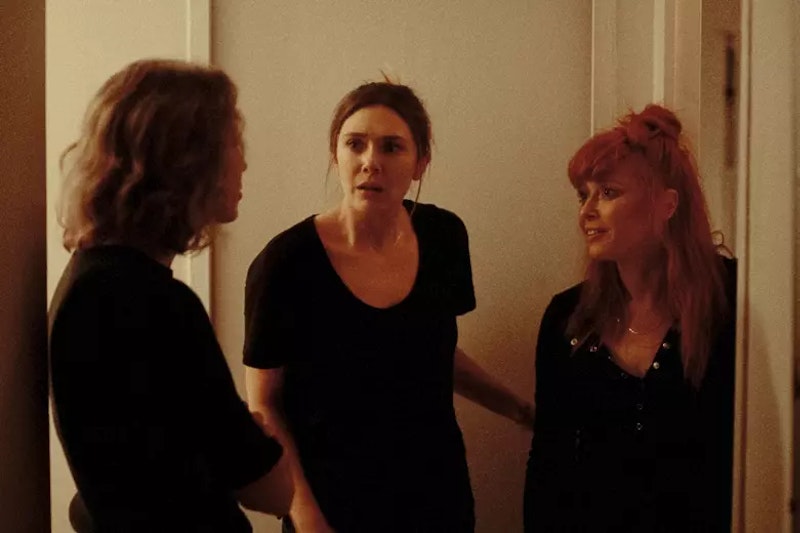His Three Daughters, writer/director Azazel Jacobs' new film, features three talented actresses in a combustible dramatic situation. The film gives them a chance to perform the hell out of a series of intense monologues. It’s satisfying, even if a choice it makes at the very end is too big a leap.
It’s like an adaptation of a play, even though it’s not. It also feels like something that would’ve played at Sundance, although it’s not that either (it debuted in Toronto a year ago and just landed in theaters ahead of a Netflix launch on September 20).
The premise is that three sisters (Carrie Coon, Elizabeth Olsen, and Natasha Lyonne) are gathered in the New York City apartment where they grew up as their father lay dying. Katie (Coon) is a type-A mom, constantly making demands on the phone about DNR orders. Christina (Olsen) is a Deadhead-turned-mom, frequently contorting herself in complex yoga poses. Rachel (Lyonne) is an unemployed layabout, chain-smoking joints, and obsessing about complex sports gambling parlays. Their father, at least most of the way, is kept off-screen, and we don’t see what happens when any of the sisters go into the room where he’s resting.
Adding to the complexity are the various step/half-sister relationships you’ll likely spend most of the movie parsing—as well as a hospice nurse (Rudy Galvan) with the on-the-nose name “Angel.” As the film goes on, decades of buried resentment among the sisters are raised. Olsen lives across the country and has been less involved, while Coon’s preoccupied with trouble with her own kids. And the other two seem to resent that Lyonne lives in the apartment and will presumably inherit it.
The setup and structure give the actresses opportunity to shine—especially Olsen, who does more natural acting after years of Marvel nonsense. Coon, so great on The Leftovers, also does some of her best movie acting to date, as does Lyonne, another actress who’s traditionally been better served by television than movies.
Jacobs previously directed The Lovers—starring Coon’s husband, Tracy Letts—and French Exit, a well-received 2020 festival movie that ran into the pandemic buzzsaw. This is my favorite of his films. That said, the film makes a choice at the end, involving the father, that’s baffling. It doesn’t work. I understand that it’s going for something similar to the great ending of Tim Burton’s Big Fish, but the choice worked in that movie because that’s what that movie was about.
Also, Olsen, who was five years old when Jerry Garcia died, isn’t nearly old enough to have ever been part of the Grateful Dead scene. I know there have been various reunions and Dead and Company tours, but in waxing nostalgic about the old Dead scene, who’s describing something like the original Dead vibe from the 1980s, the math doesn’t add up. And since the film features modern smartphones, weed dispensaries, and legalized sports betting, there’s no way it’s set in the past.

